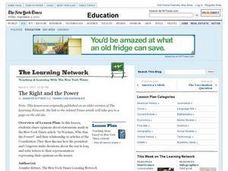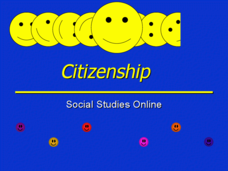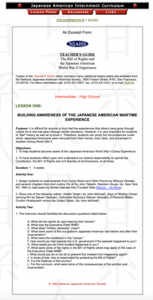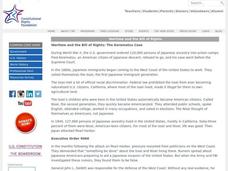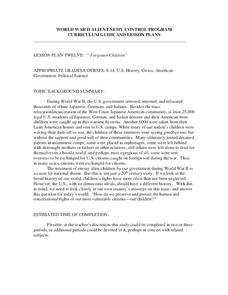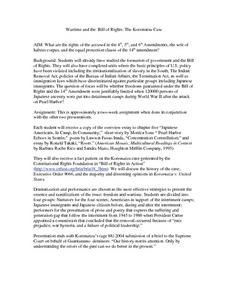Project Tahoe
Individual Rights vs. The Greater Good Within the Scope of War
When, if ever, is the government justified in restricting individual rights? When, if ever, should the "greater good" trump individual rights? To prepare to discuss this hot-button topic, class members examine primary source documents,...
Curated OER
The Right and the Power
Students read, discuss and analyze the New York Times article "In Wartime, Who Has the Power?" and relate the article to the Constitution. They then brainstorm how the president and Congress make decisions about the war in Iraq and write...
Curated OER
Citizenship
Young students view this presentation which goes over the concepts of being a good citizen, what volunteers do, what our basic rights are, and what types of organizations in our society are considered to be led by volunteers. The last...
Curated OER
Finding the Right Words
Students analyze quotes from wartime articles by journalists and identify the key elements that help to capture the moment and convey what is happening to the larger population at home. They observe a scene and write a short paragraph...
Curated OER
Building Awareness of the Japanese American Wartime Experience
Pupils research the Japanese American World War II Camp Experience. They discuss the experience in the context of civil rights and the Bill of Rights.
Curated OER
Wartime and the Bill of Rights: The Korematsu Case
Students examine the balance between civil liberties and protection. In this national security lesson, students explore the Korematsu case which references the Japanese internment camps of World War II. Students draw comparisons between...
Echoes & Reflections
The Children and Legacies Beyond the Holocaust
Using video testimony, primary source documents that detail international agreements, and structured discussions, learners consider the precarious position of children during the Holocaust and other international conflicts, and how to...
Curated OER
And Justice For All
Students compare three justice systems currently in place in the United States: the civilian criminal justice system, the military criminal justice system (courts-martial) and the secret wartime tribunals that President Bush has proposed...
Curated OER
Civil Rights and Casualties of Wartime
Do your historians fully grasp the consequences of being at war? Help them connect past with present through this group research activity, which has students analysing repercussions suffered by citizens of countries in conflict. Students...
Curated OER
Wartime and the Bill of Rights: The Korematsu Case
Twelfth graders work together in groups to examine the discrimation Japanese Americans felt after the bombing of Pearl Harbor. Using primary source documents, they analyze and discuss the case of Fred Korematsu who was placed in an...
Cheryl L. Mason and William G. Thomas
Comparative Effects of Financing the Civil War
How do countries fund wars? Learners examine the economics of warfare through a comprehensive study of what measures were taken to fund wartime activities during the American Civil War. They'll start by reading a newspaper article from...
DocsTeach
WWI Propaganda and Art
Uncle Sam wants you! During World War II, the US government and military created a propaganda campaign to gain public support. The activity uses primary documents such as photos to explain how and why the propaganda campaign was...
Curated OER
Debate: Press Censorship
Students consider the responsibility of the media to present newsworthy items while still protecting national security during times of war. They take sides acting as politicians and newsmen and debate the merits of censorship of the media.
Curated OER
A Way with Words
How do facts and opinions impact the news? After reading "How to Cover a War" from the New York Times, middle schoolers evaluate the claims in the article. They also consider the media's responsibilities in reporting during wartime....
Curated OER
Government: War Powers Limitations
Students examine historic examples of authority during wartime. They interpret the Fifth Amendment. They debate the merits of the Patriot Act.
Curated OER
World War II Alien Enemy Control Program
Students become familiar with the concepts of human rights and constitutional rights. They have an increased awareness of the historical record as to the cessation of these rights, especially in regards to children during WWII. It is...
Curated OER
Wartime and the Bill of Rights: The Korematsu Case (Lesson 2)
Twelfth graders review how the government and Bill of Rights came into effect. Using primary source documents, they discuss if Japanese rights were violated when they were placed in internment camps after the bombing of Pearl Harbor. ...
Curated OER
the Rights of Detainees At Guantanamo Bay
Students identify the legal issues involved in the case of the detainees being held at Guantanamo Bay and surrounding the existence of the base itself. They explain the clash between civil liberties and national security during wartime.
Curated OER
To Be Black and American: World War II
Twelfth graders research wartime conditions African American had to endure during World War II. They explain what role African Americans played in World War II and describe what life was like for African Americans in the United States...
K12 Reader
Responsibilities of Citizenship
Your pupils are all citizens of your classroom. Provide some more instruction on how people can be citizens with the reading passage included here. After reading, learners answer the five related questions.
Civil War Trust
Civil War Play
Raise the curtain to a class play that depicts the Civil War through both factual information and literary devices. The performance showcases the Battle of Antietam (Battle of Sharpsburg) and brings attention to women's roles, as well as...
Center for History Education
To What Extent Were Women's Contributions to World War II Industries Valued?
Women rose to the challenge when the nation's war effort called them—but were sent home when the GIs came back from World War II. Young historians consider whether the United States valued women's contributions during the war using a...
Curated OER
Abraham Lincoln and Reconstruction
Students study Presidential Reconstruction during the Civil War years. They examine the role of the Executive Branch of government, especially in wartime. They investigate the complex issues of how Congress took on the role of...
Curated OER
Affects of Prejudicial Attitudes
Second graders explore the concept of cultural assimilation. They study the affects of prejudice on the authors of Curious George (Margret & H. A. Rey). They communicate ideas and opinions of the rights and responsibilities of...



